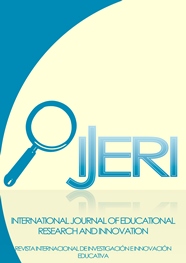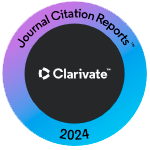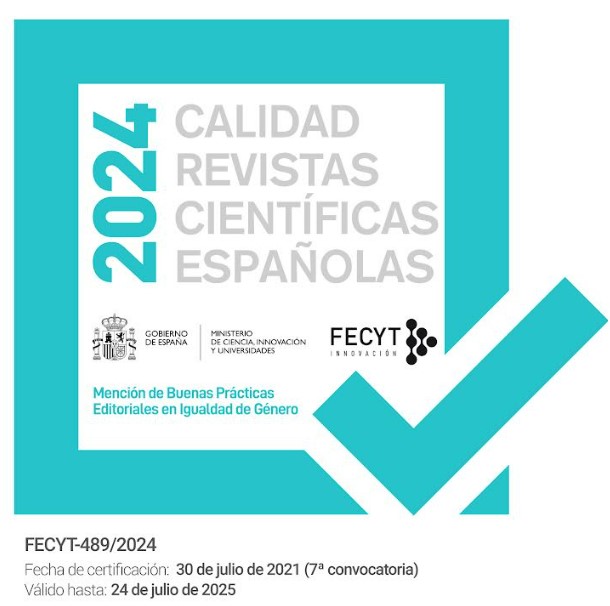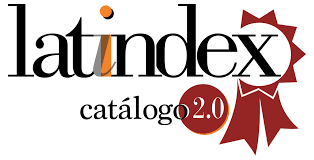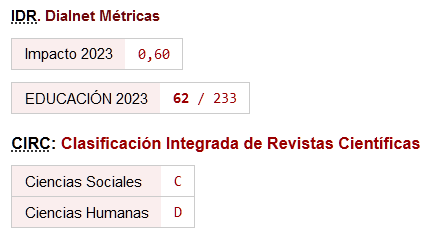Estrés tecnológico, desempeño laboral, satisfacción laboral y compromiso profesional de los maestros en medio de la crisis de COVID-19 en Filipinas
DOI:
https://doi.org/10.46661/ijeri.6145Palabras clave:
Tecnología educativa, efectos psicológicos, educación a distancia, profesores, pandemia, FilipinasResumen
La percepción de tecnoestrés en la educación en constante aumento a niveles sin precedentes no es nueva. Sin embargo, en situaciones novedosas como la crisis global del COVID-19, el tecnoestrés y su influencia en importantes facetas de la enseñanza merecen una revisión. Este artículo se centra en la asociación del tecnoestrés sobre las características de la muestra y las variables de desempeño organizacional de los docentes en el contexto de la educación a distancia de emergencia que trajo la crisis del COVID-19. Siguiendo un diseño de investigación principalmente correlacional, se tomó como muestra a 2272 profesores de Mindanao, Filipinas. Los datos recolectados a través de instrumentos adaptados fueron tratados mediante estadística descriptiva e inferencial. Los resultados mostraron que los docentes experimentan un nivel moderado de tecnoestrés, niveles muy altos de desempeño y satisfacción laboral y un alto nivel de compromiso con la carrera. Además, se reveló que el tecnoestrés y sus cuatro conjuntos diferían significativamente según la edad, el género, el estado civil y la experiencia docente. Por último, se encontró que el tecnoestrés tiene una relación negativa significativa con el desempeño laboral. Las implicaciones prácticas de estos resultados en el desarrollo profesional de los profesores en el contexto de la educación a distancia de emergencia se discuten al final del estudio.
Descargas
Citas
Akinwale, A. S., & Okotoni, C. A. (2019). Assessment of job commitment of secondary school teachers in Osun State, Nigeria. PEOPLE: International Journal of Social Sciences, 4(3), 1553-1572. https://doi.org/10.20319/pijss.2019.43.15531572
Annalakshmi, N., & Jayanthy, A. C. (2019). Blended Learning: Augmenting Academic Performance of High School Students. International Journal of Advanced Science and Technology, 28(18), 677-683.
http://sersc.org/journals/index.php/IJAST/article/view/2785
Anoba, J. L. D., & Cahapay, M. B. (2020). The readiness of teachers on blended learning transition for post-COVID-19 period: An assessment using parallel mixed method. PUPIL: International Journal of Teaching, Education and Learning, 4(2), 295-316. https://doi.org/10.20319/pijtel.2020.42.295316
Ayyagari, R., Grover, V., & Purvis, R. (2011). Technostress: Technological antecedents and implications. MIS Quarterly, 35(4), 831-858. https://doi.org/10.2307/41409963
Barron, M., Cobo, C., Munoz-Najar, A., & Ciarrusta, I. S. (2021, February 18). The changing role of teachers and technologies amidst the COVID 19 pandemic: key findings from a cross-country study. World Bank Blogs. https://blogs.worldbank.org/education/changing-role-teachers-and-technologies-amidst-covid-19-pandemic-key-findings-cross
Efilti, E., & Çoklar, A. N. (2019). Teachers' Technostress Levels as an Indicator of Their Psychological Capital Levels. Universal Journal of Educational Research, 7(2), 413-421. https://doi.org/10.13189/ujer.2019.070214
Cahapay, M. B. (2020). A reconceptualization of learning space as schools reopen amid and after COVID-19 pandemic. Asian Journal of Distance Education, 15(1), 269-276. https://doi.org/10.5281/zenodo.3892969
Cahapay, M. B. (2021). To get or not to get: Examining the Intentions of Philippine Teachers to Vaccinate against COVID-19. Journal of Human Behavior in the Social Environment, 1-11. https://doi.org/10.1080/10911359.2021.1896409
Carreon,T. R., Rotas, E. E., Cahapay, M. B., Garcia, K. A., Amador, R. M., & Anoba, J. L. D. (2021). Fear of COVID-19 and Remote Teaching Burnout of Philippine K to 12 Teachers. IJERI: International Journal of Educational Research and Innovation, (15), 552-567. https://doi.org/10.46661/ijeri.5853
Çoklar, A. N., & Bozyiğit, R. (2021). Determination of Technology Attitudes and Technostress Levels of Geography Teacher Candidates. International Journal of Geography and Geography Education, 44, 102-111. https://doi.org/10.32003/igge.933183
Çoklar, A. N., Efilti, E., & Şahin, Y. L. (2019). Technostress as a Factor Affecting the Use of Technology by Beginning Teachers. Handbook of Research on Faculty Development for Digital Teaching and Learning. https://doi.org/10.4018/978-1-5225-8476-6.ch023
Ennis, L. A. (2005). The evolution of technostress. Computers in Libraries, 25(8), 10-12. https://eric.ed.gov/?id=EJ718549
Estrada-Muñoz, C., Castillo, D., Vega-Muñoz, A., & Boada-Grau, J. (2020). Teacher technostress in the Chilean school system. International Journal of Environmental Research and Public Health, 17(15), 1-17. https://doi.org/10.3390/ijerph17155280
Hassan, N., Yaakob, S. A., Mat Halif, M., Abdul Aziz, R., Abdul Majid, A., & Sumardi, N. A. (2018). The effects of technostress creators and organizational commitment among school teachers. Asian Journal of University Education, 15(3), 92-102. https://eric.ed.gov/?id=EJ1238657
Heo, E. J., & Jung, M. S. (2020). Effects of Nurses' Technostress on Organizational Performance. The Korean Journal of Health Service Management, 14(3), 15-30. https://doi.org/10.12811/kshsm.2020.14.3.015
Isiakpona, C., & Adebayo, O. (2011). The Impact of Technostress on Librarians: A Survey of Covenant University Library. The Information Manager, 11(1-2), 56-61. https://www.ajol.info/index.php/tim/article/view/83640
Jameel Abo Mokh, A., Jameel Shayeb, S., Badah, A., Asim Ismail, I., Ahmed, Y., K. A. Dawoud, L., & Essam Ayoub, H. (2021). Levels of Technostress Resulting from Online Learning among Language Teachers in Palestine during the Covid-19 Pandemic. American Journal of Educational Research, 9(5), 243-254. https://doi.org/10.12691/education-9-5-1
Khuzaini, K., & Zamrudi, Z. (2021). Technostress among marketing employee during the COVID-19 pandemic: Exploring the role of technology usability and presenteeism. JEMA: Jurnal Ilmiah Bidang Akuntansi dan Manajemen, 18(1), 36-60. http://dx.doi.org/10.31106/jema.v18i1.10050
Laspinas, M. L. (2015). Technostress: trends and challenges in the 21st century knowledge management. European Scientific Journal, 11(2), 205-217. https://core.ac.uk/reader/328024750
Lau F. (2017). Methods for Correlational Studies. In Lau F., & Kuziemsky C. (Eds.). Handbook of eHealth Evaluation: An Evidence-based Approach [Internet]. Victoria: University of Victoria. https://www.ncbi.nlm.nih.gov/books/NBK481614/
Lavrakas, P. J. (2008). Encyclopedia of survey research methods (Vols. 1-0). Thousand Oaks, CA: Sage Publications, Inc. https://doi.org/10.4135/9781412963947
Li, L., & Wang, X. (2021). Technostress inhibitors and creators and their impacts on university teachers’ work performance in higher education. Cognition, Technology & Work, 23(2), 315-330. https://doi.org/10.1007/s10111-020-00625-0
Magistra, S. N., Santosa, S., & Indriayu, M. (2021). Effect of Self-Efficacy and Technostress on Teacher Performance through Organizational Commitments. Dinamika Pendidikan, 16(1), 75-82. https://doi.org/10.15294/dp.v16i1.28993
Penado Abilleira, M., Rodicio-García, M. L., Ríos-de Deus, M. P., & Mosquera-González, M. J. (2021). Technostress in Spanish University Teachers During the COVID-19 Pandemic. Frontiers in psychology, 12(617650), 1-12. https://doi.org/10.3389/fpsyg.2021.617650
Pepe, J. (2011). The Relationship of Principal Resiliency to Job Satisfaction and Work Commitment: An Exploratory Study of K–12 Public School Principals in Florida. University of South Florida. https://digitalcommons.usf.edu/etd/3289/
Ragu-Nathan, T. S., Tarafdar, M., Ragu-Nathan, B. S., & Tu, Q. (2008). The consequences of technostress for end users in organizations: Conceptual development and empirical validation. Information systems research, 19(4), 417-433. https://doi.org/10.1287/isre.1070.0165
Rogayan Jr., D. V., & Dantic, M. J. P. (2021). Backliners: Roles of Science Educators in the Post-COVID Milieu. Aquademia, 5(2), ep21010. https://doi.org/10.21601/aquademia/11053
Salanova, M., Llorens, S., & Ventura, M. (2014). Technostress: The dark side of technologies. In The impact of ICT on quality of working life (pp. 87-103). Springer, Dordrecht. https://doi.org/10.1007/978-94-017-8854-0_6
Scaramuzzino, G., & Martinell Barfoed, E. (2021). Swedish social workers’ experiences of technostress. Nordic Social Work Research, 1-14. https://doi.org/10.1080/2156857X.2021.1951335
Shintri, S., & Narasalagi, V. M. (2021). Effect of Technological Intervention on Work-Life Balance. IOSR Journal of Business and Management, 23(6), 28-32. https://www.iosrjournals.org/iosr-jbm/papers/Vol23-issue6/Series-3/D2306032832.pdf
Sousa, V. D., Driessnack, M., & Costa Mendes, I. A. (2007). An overview of research designs relevant to nursing: Part 1: Quantitative research designs. Revista Latino-Americana de Enfermagem 15(3), 502-207. https://doi.org/10.1590/S0104-11692007000300022
Starkey, A., Shonfeld, M., Prestridge, S., & Cervera, M. (2021). Special issue: Covid-19 and the role of technology and pedagogy on school education during a pandemic. Technology, Pedagogy and Education, 30(1), 1-5. https://doi.org/10.26686/wgtn.14109866.v1
Tarafdar, M., Tu, Q., & Ragu-Nathan, T. S. (2010). Impact of technostress on end-user satisfaction and performance. Journal of Management Information Systems, 27(3), 303-334. https://doi.org/10.2753/MIS0742-1222270311
Tu, Q., Wang, K., & Shu, Q. (2005). Computer-related technostress in China. Communications of the ACM, 48(4), 77–81. https://doi.org/10.1145/1053291.1053323
Yadav, A., & Rahaman, A. (2020). Technostress Level of Teachers in Higher Education with Reference to Socio-Demographic Variables. Periodic Research, 9(2), 58-65. http://www.socialresearchfoundation.com/researchtimesview.php?id=399
Descargas
Publicado
Cómo citar
Número
Sección
Licencia
Derechos de autor 2021 Michael Cahapay, Nathaniel F. Bangoc II

Esta obra está bajo una licencia internacional Creative Commons Atribución-NoComercial-SinDerivadas 4.0.

